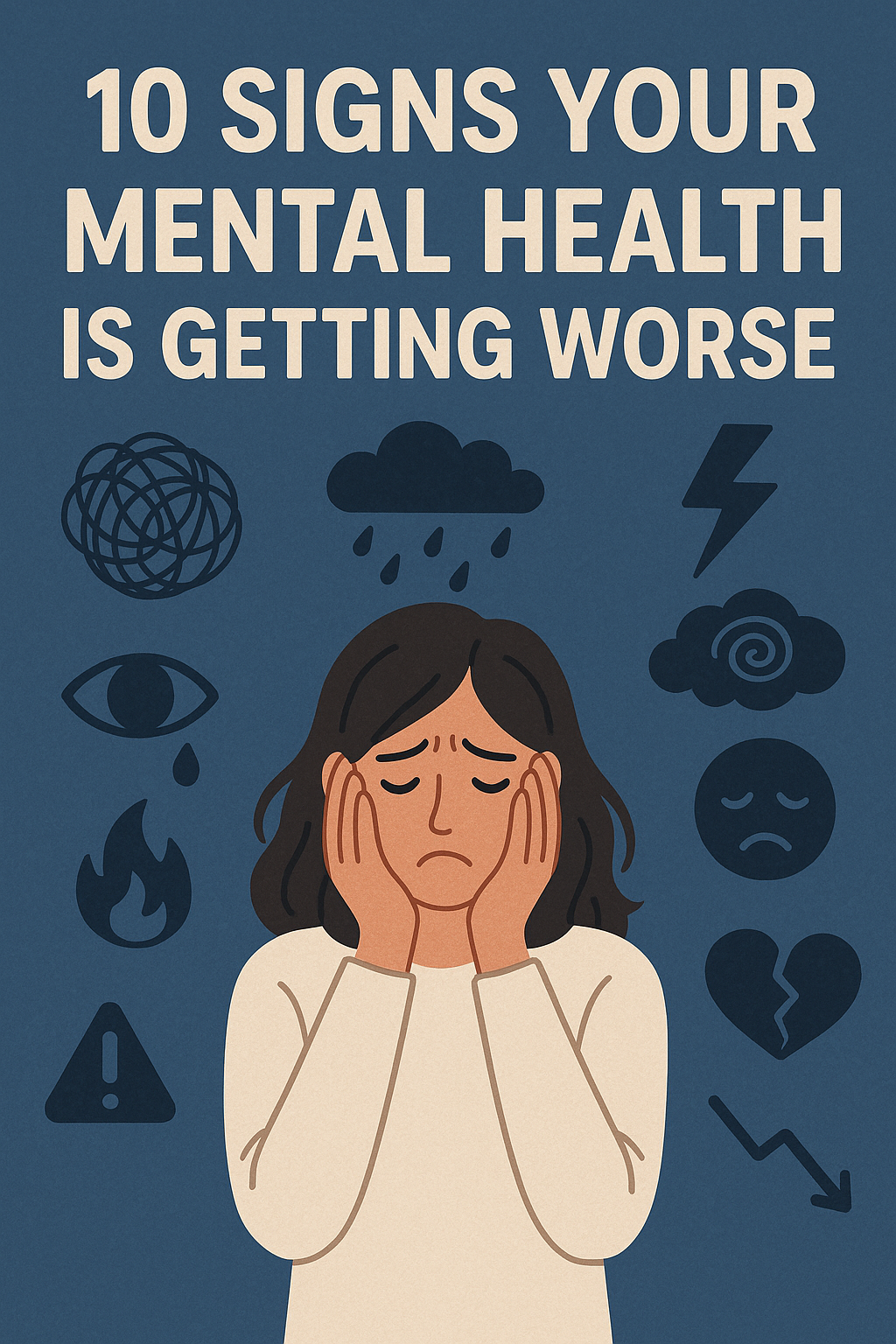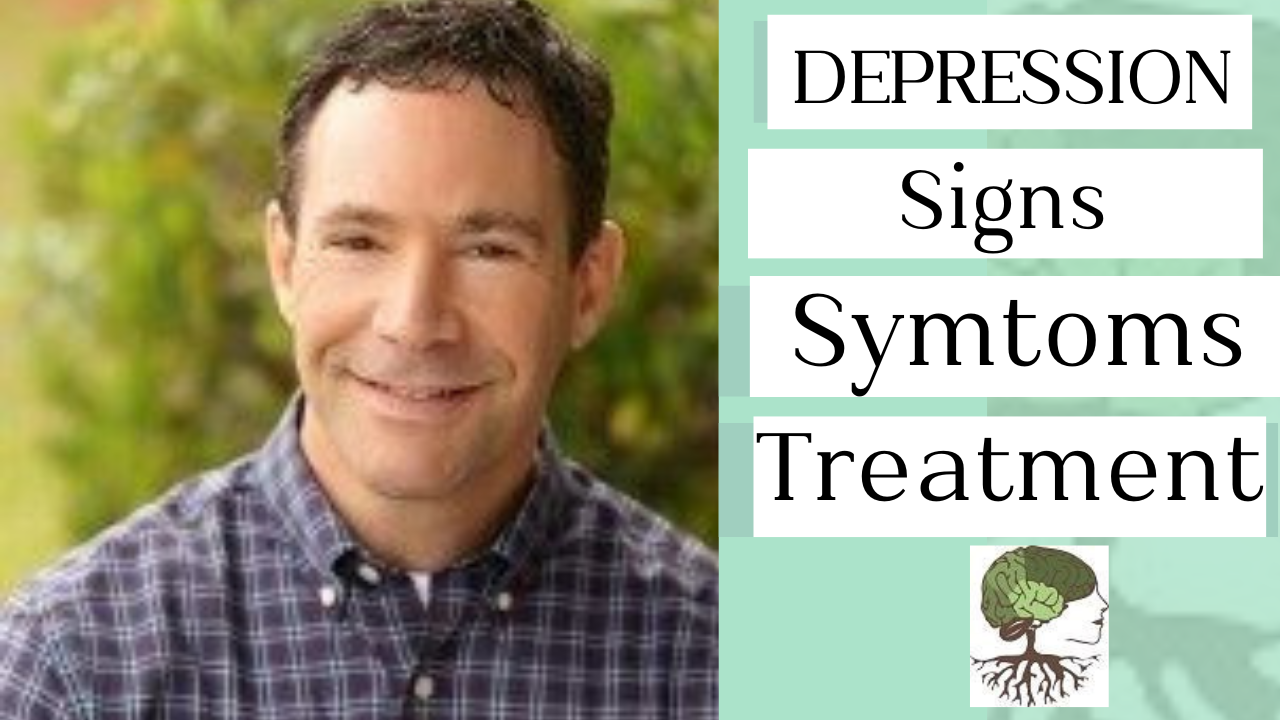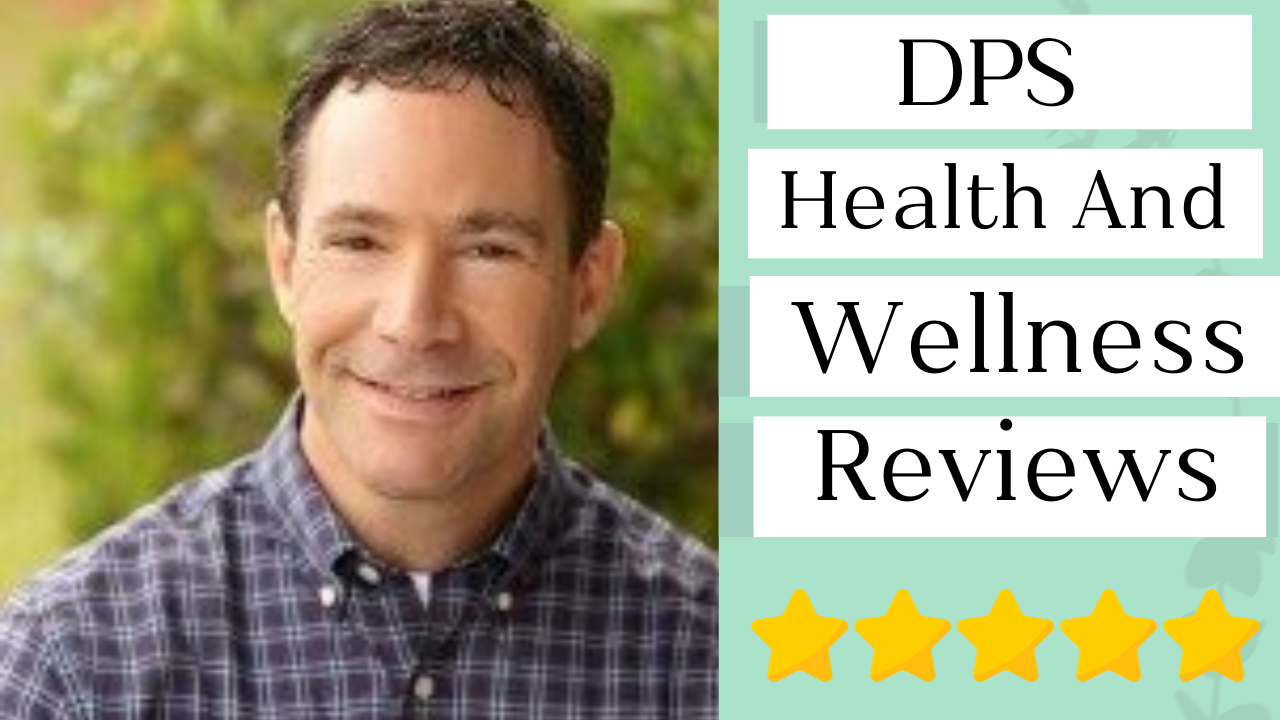This article discusses the signs that indicate a decline in mental health, highlighting key symptoms such as losing interest in activities, feeling overwhelmed, decreased social desire, inconsistent sleep, constant fatigue, increased anxiety, difficulty concentrating, impulse control struggles, and feelings of disconnection.
It emphasizes the importance of recognizing these signs early and explores teletherapy options available through DPS Health and Wellness to support those experiencing worsening mental health.
Your mental health affects every aspect of your life – whether you’re dealing with a diagnosed condition like sexual anorexia or not. Like a delicate balance, mental well-being can shift and change depending on life’s pressures and challenges.
Think of your mental health as a personal weather system. Just as you check the forecast to prepare for the day ahead, monitoring your psychological state helps you navigate life’s storms and sunshine. These changes in your mental climate can range from subtle shifts to significant transformations.
Why Recognizing Mental Health Changes Matters:
- Early detection prevents deeper struggles
- Timely intervention leads to better outcomes
- Self-awareness empowers proactive care
- Professional support becomes more effective
When you notice your mental health taking a downward turn, it’s not a sign of weakness – it’s your mind signaling for attention and care. Understanding these warning signs serves as your emotional compass, guiding you toward help when you need it most.
Let’s explore 10 key indicators that might suggest your mental health needs extra attention and support. This could be the time to consider exploring options such as virtual mental health patient portals for easier access to professional help or seeking adult ADHD treatment tips if you’re struggling with concentration issues. If you’re in Savannah, GA, psychiatric evaluations might provide valuable insights into your mental health status. Furthermore, with the rise of telehealth services, telehealth ADHD options are now available for those who prefer receiving treatment from the comfort of their home.
Signs Your Mental Health is Getting Worse
Mental health changes can be subtle, yet recognizing these shifts early allows for timely intervention and support. Let’s explore the first significant indicator that your mental well-being might be declining.
1. Losing Interest in Activities
Have your favorite activities suddenly lost their appeal? A noticeable decline in enthusiasm for life’s simple pleasures often signals a shift in mental health. This change might manifest as:
- Feeling meh about hobbies that once brought joy
- Struggling to find motivation for previously enjoyed activities
- Experiencing a sense of emptiness during recreational pursuits
- Abandoning regular pastimes without replacing them
This loss of interest, known clinically as anhedonia, can stem from various underlying factors, such as overwhelming stress levels, mounting responsibilities, emotional exhaustion, or potential depression.
When daily activities feel like mountainous tasks, your mind might be signaling for help. Picture a dimmer switch gradually turning down – the light hasn’t gone out, but the brightness that once illuminated your interests has diminished.
What You Can Do
- Reach out to trusted friends or family members
- Share your feelings with understanding listeners
- Consider speaking with a mental health professional
- Start small – engage in brief moments of enjoyable activities
If you find these feelings are persistent and debilitating, it may be beneficial to seek professional help. Telepsychiatry, which offers the convenience of receiving mental health care remotely, could be an option worth exploring. Moreover, if you’re also noticing symptoms associated with conditions like ADHD, it’s crucial to address these with a healthcare provider who can offer appropriate guidance and support.
Remember, losing interest in activities doesn’t mean you’ll never enjoy them again. This experience is common and treatable with proper support and care from professionals who understand your needs. If you’re located in Savannah and seeking help, there are several mental health care facilities available that can provide the necessary assistance.
2. Feeling Overwhelmed Easily
A simple to-do list with two or three tasks can suddenly feel like ten overwhelming responsibilities. This heightened sense of being overwhelmed, particularly with everyday activities, serves as a crucial indicator of declining mental well-being.
According to psychotherapist Sheri Jacobson, feeling mentally overwhelmed often stems from an internal reaction to excessive outside stress. Your mind might struggle to process and manage even minor challenges when experiencing elevated stress levels.
Practical strategies to manage overwhelming feelings:
- Practice mindful journaling to process thoughts and emotions
- Create smaller, manageable chunks of tasks
- Set realistic daily goals
- Take regular breaks between activities
- Implement meditation or deep breathing exercises
- Step away from stressful situations temporarily
- Focus on one task at a time
Remember that feeling overwhelmed doesn’t mean you’re failing – it’s your mind signaling a need for support and attention. These feelings often arise when stress accumulates without proper outlets for release.
3. Decreased Desire for Socializing
A noticeable shift in your social engagement patterns can signal deteriorating mental health. When social interactions start feeling exhausting rather than energizing, it’s time to pay attention. This change affects everyone differently – whether you’re an introvert, extrovert, or somewhere in between.
Your natural comfort level with social interaction serves as a personal baseline. When you find yourself consistently withdrawing below this baseline, your mental well-being might be struggling. Some common signs include:
- Avoiding phone calls or text messages from friends
- Canceling plans at the last minute
- Feeling drained after brief social encounters
- Making excuses to skip social gatherings
Social connections play a vital role in maintaining good mental health. Regular interaction with others can:
- Release mood-boosting hormones
- Provide emotional support
- Create opportunities for joy and laughter
- Help process difficult emotions through sharing
Finding the right balance between solitude and social engagement is key. Start small – a brief video call with a close friend or a short coffee meet-up can help rebuild your social energy gradually. Remember, pushing yourself too hard might create additional stress, so listen to your body and pace yourself accordingly.
4. Inconsistent Sleep Schedule
Sleep patterns are a crucial indicator of mental health. A disrupted sleep schedule – whether it’s difficulty falling asleep, staying asleep, or sleeping excessively – can signal deteriorating mental well-being.
Key Signs of Sleep Disruption:
- Sleeping at random hours
- Difficulty waking up at intended times
- Sleeping through the day
- Persistent insomnia despite feeling tired
Your body thrives on regularity, and an erratic sleep schedule can create a challenging cycle. Poor sleep impacts your mental health, which in turn makes it harder to maintain healthy sleep patterns.
Creating a Consistent Sleep Schedule:
- Set fixed bedtime and wake-up times
- Create a calming pre-sleep ritual (reading, gentle stretching, meditation)
- Keep your bedroom cool and dark
- Turn off electronic devices 1-2 hours before bed
- Avoid caffeine after mid-afternoon
- Practice relaxation techniques like deep breathing
Remember: A regulated sleep schedule acts as a powerful tool in maintaining mental wellness. Small adjustments to your sleep routine can lead to significant improvements in your mental health journey.
5. Constant Fatigue Despite Adequate Rest
Mental exhaustion feels different from physical tiredness. You might find yourself feeling completely drained despite getting enough sleep and eating well. This ongoing fatigue can feel like climbing a mountain with weights on your shoulders.
According to research from Healthline, long-term stress often leads to mental exhaustion, making even simple daily tasks feel overwhelming. The signs include:
- Difficulty completing basic responsibilities
- A heavy, weighed-down sensation
- Physical tiredness that rest doesn’t resolve
- Decreased motivation and energy levels
Effective strategies to combat mental exhaustion:
- Practice daily gratitude exercises
- Incorporate gentle yoga or stretching
- Engage in relaxation techniques
- Seek professional guidance for medication if needed
Remember that treatment approaches vary for each individual. Some people benefit from mindfulness practices, while others might need a combination of therapy and medication to address the underlying causes of their exhaustion.
6. Increasing Anxiety Levels
Do you wake up feeling anxious and carry that anxiety with you all day? When your anxiety levels go up noticeably, it often means your mental health is getting worse, making it hard to enjoy your daily activities.
Anxiety shows itself through specific mental and physical signs:
- Physical Signs
- Your heart is racing
- You’re breathing faster than usual
- You feel nauseous
- Your muscles are tense
- Mental Signs
- Your thoughts are racing
- You’re constantly worried
- It’s hard for you to focus
- You have a feeling that something bad is going to happen
Anxiety affects everyone differently. You might feel it as a reaction to stress, even if you don’t have an official anxiety disorder. The important thing is to keep track of how anxious you feel. If there’s a big change from what you’re used to, pay attention because it could mean you’re developing conditions like generalized anxiety disorder or panic disorder.
If your anxiety starts getting in the way of your everyday life, relationships, or work performance, it’s a good idea to talk to a mental health professional. They can help you find effective ways to cope and treatment options that are right for you. For example, anxiety treatment options in Savannah or anxiety workshops and events in Statesboro could be helpful. Also, remember that sometimes anxiety can occur along with other mental health problems like major depressive disorder, which also needs professional help for proper management.
7. Difficulty in Concentration
Do you find yourself having to reread the same passage multiple times? Are simple tasks taking longer to complete than usual? A declining ability to focus can signal deteriorating mental health.
Mental and emotional scattered feelings often manifest as:
- Struggling to comprehend written material
- Difficulty staying on task
- Inability to process information effectively
- Reduced productivity at work or school
This lack of focus isn’t just frustrating – it’s your mind’s response to being overwhelmed. When stress levels rise, your brain enters a protective state that makes concentration challenging.
Practical Steps to Improve Focus:
- Practice mindfulness meditation for 5-10 minutes daily
- Use the Pomodoro Technique (25-minute focused work periods)
- Create a dedicated, quiet workspace
- Break large tasks into smaller, manageable chunks
- Take regular breaks to prevent mental fatigue
Remember: These concentration issues are valid and normal during periods of mental health strain. If focus problems persist, speaking with a mental health professional can help identify underlying causes and develop personalized coping strategies.
Additionally, if you’re struggling with ADHD, these ADHD management techniques could be beneficial. Employing strategies such as the Pomodoro technique can significantly improve your ability to concentrate and boost productivity.
8. Struggles with Impulse Control
Acting on impulse can be a telling sign of deteriorating mental health. When emotional distress becomes overwhelming, many people turn to unhealthy coping mechanisms like:
- Excessive retail therapy
- Binge-watching shows for hours
- Extended gaming sessions
- Compulsive eating
- Risky behaviors
These impulsive actions often serve as attempts to:
- Fill an emotional void
- Distract from underlying issues
- Temporarily escape from stress
- Self-soothe during difficult times
The key to addressing impulse control struggles lies in uncovering the root causes driving these behaviors. Journaling can help identify triggers and patterns behind impulsive actions. Mindfulness practices create space between urges and actions, allowing for more conscious decision-making.
Professional therapy provides essential tools to develop healthier coping strategies, process underlying emotional pain, build stronger self-regulation skills, and create sustainable behavior changes. This therapeutic approach can significantly illuminate the path out of depression, helping individuals regain control over their impulses and emotions.
9. Feeling Disconnected or Unbalanced
If you often feel like you’re going through life without any direction, it could be a sign that your mental health is declining. When you’re having trouble feeling connected to yourself and the world around you, you might notice:
- Feeling detached from your surroundings
- Struggling to make decisions
- Experiencing a sense of being outside your body
- Lacking confidence in everyday activities
The root chakra, located at the base of your spine, is important for helping you feel secure and balanced. When this energy center is out of sync, try these techniques to ground yourself:
- Connect with Nature: Take mindful walks outdoors, feeling the earth beneath your feet
- Awareness of Your Body: Practice gentle yoga or stretching to reconnect with your physical self
- Engage Your Senses: Pay attention to what you can see, hear, touch, smell, and taste in your immediate environment
- Meditate: Set aside quiet moments to center yourself through breathing exercises
Remember, feeling ungrounded doesn’t mean you’re losing control. It’s a normal reaction to stress and changes in life. By incorporating these grounding practices into your routine, you can regain a sense of stability and presence.
Seeking Help for Declining Mental Health: Teletherapy Options with DPS Health and Wellness
If you recognize any signs of declining mental health in your life, you’re not alone. DPS Health and Wellness offers compassionate teletherapy services to support you through these challenging times.
Why Choose Teletherapy with DPS Health and Wellness?
- Convenient access to mental health care from your home
- Flexible scheduling options Monday-Thursday, 8:00 AM – 6:30 PM
- Professional support from experienced, caring therapists
- Insurance coverage available for teletherapy sessions
Our dedicated team at DPS Health and Wellness creates a warm, trusting environment where you can share openly and receive personalized care. Dr. David Samuels and our staff are committed to providing patient-centered solutions for various mental health concerns.
We understand that seeking help is often the first step towards recovery. Whether you’re dealing with mood swings, overcoming procrastination related to ADHD, or even compulsive behaviors, our professional therapists are here to help.
Ready to prioritize your mental well-being?
🌟 Call us at 912-662-6501 to schedule your teletherapy appointment
🌟 Visit www.dpshealthandwellness.com to learn more about our services
🌟 Two convenient locations in Savannah and Statesboro, GA
If you’re in need of a licensed counselor in Statesboro, Georgia, we have the resources to assist you. Your journey to better mental health starts with a single step – reach out today.
FAQs (Frequently Asked Questions)
What are common signs that indicate my mental health might be getting worse?
Common signs include losing interest in activities you once enjoyed, feeling overwhelmed easily, decreased desire for socializing, inconsistent sleep schedules, constant fatigue despite adequate rest, increasing anxiety levels, difficulty concentrating, struggles with impulse control, and feeling disconnected or unbalanced.
Why is it important to recognize signs of deteriorating mental health early?
Recognizing early signs of worsening mental health is crucial because it allows you to seek timely help and support, which can prevent further decline and promote overall well-being.
How can losing interest in hobbies signal a decline in mental health?
A significant loss of interest in previously enjoyed activities can be a warning sign of depression or other mental health issues. Persistent disinterest should prompt seeking professional help to address underlying causes.
What strategies can help manage feelings of being overwhelmed or increased anxiety?
Practical coping strategies include deep breathing exercises, taking breaks during stressful situations, practicing mindfulness or meditation, and seeking professional support if anxiety symptoms significantly increase.
How does an inconsistent sleep schedule affect mental health?
Disruptions in sleep patterns such as insomnia or excessive sleeping can contribute to further deterioration of mental health. Establishing a consistent sleep routine with relaxing bedtime habits and limiting screen time before bed can help regulate sleep.
What teletherapy options are available for those experiencing declining mental health?
Teletherapy services like those offered by DPS Health and Wellness provide convenient access to professional support online. These services often accept insurance coverage and allow individuals to schedule appointments easily via www.dpshealthandwellness.com.




